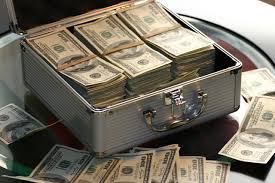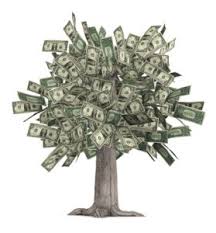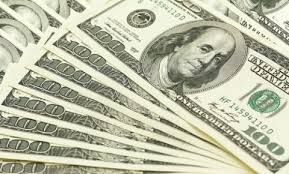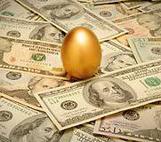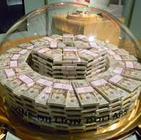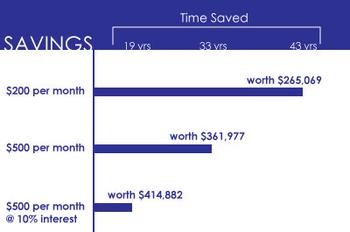Prestige Professional Management
Your Consumer Resource Specialist
All over the Internet, you'll find calculators that tell you how much you need to save each month in order to have a million dollars by an age you specify. For instance, if you're 30 years old, have $5,000 already, save $100 per month, and can earn 8 percent interest, you'll be a millionaire in a mere 51 years -- at the ripe old age of 81. Most calculators will also tell you how much that million will actually be worth by that time because of inflation. In our example case of 51 years, a million dollars will only be worth $213,215 in today's dollars, which probably won't be enough for financial freedom.
Saving with Investments at 10%
Dictionary definition:An abundance of valuable material possessions or resources; riches.
The state of being rich; affluence.
All goods and resources having value in terms of exchange or use.
A great amount; a profusion
The World is Yours
What it Takes
Creating the Dollars
The Millionaire Lifestyle
Should the Dollar Be Saved...(or Invested)
How to Become Wealthy
Ten Truths That Can Set You on the Path to Financial Freedom
"Lifestyles of the Rich and Fabulous"
The Millionaire
Creating a millionaire mindset is pivotal in your success. What do you put into your brain daily? In other to create a millionaire mindset you have to increase your knowledge and the only way of doing this is by educating yourself. There are no shortcuts! You have to invest in educating yourself. You must avoid negative thoughts and be positive at all times, thoughts or comments like "I will try" or "I hope this works" automatically sets your brain up for failure. You should be confident that your business will succeed because you will be responsible in making it a success. You are the only one that has the power to make your life the way you want it and it can be done only if you educate yourself the right way.
We all imagine millionaires drinking expensive champagne at breakfast, driving expensive cars, shopping at the most prestigious establishments and vacationing in exotic locations. And of course many millionaires (and multimillionaires) do that.
However, several researchers have studied the lifestyles of millionaires and come to the conclusion that the majority of them don't live that way at all. That's part of why they're millionaires.
Thomas Stanley and William Danko's book "The Millionaire Next Door" revealed that most millionaires really could be the folks next door. They don't drive a new car every year or jet around the world. In fact, sometimes they're the least likely person you would suspect.
A million dollars just isn't what it used to be. Thanks to inflation, there are more millionaires today than ever before. Last year, the Wall Street Journal reported that there were 7.5 million millionaires in the world in 2004 -- a record number.
At the end of 1999 there were 2.8 million Americans with $1 million in investable assets (meaning the value of their homes is not included among those assets). These are high-net-worth individuals (HNWI). About 2.5 million people had $1 to $5 million of investable assets; 200,000 had $5 million to $10 million, and the rest had more than $10 million. That's not counting the number of people in this country who have a million-dollar net worth if you include their principle residence.
Before we get into becoming a millionaire, let's define the target. What makes someone a millionaire? Is it having a million dollars in the bank? Sure, unless they also owe a million. Is someone who owns a house that's worth a million dollars a millionaire? Not if there's a mortgage on it.
Most people define a millionaire as someone with financial assets that add up to a million dollars -- in other words, someone with a net worth of a million dollars. There are different ways to determine net worth, however. Some count the value of the person's primary residence, while others do not. For many of us, our primary residence is our most valuable asset, so not counting it as part of our net worth significantly lowers our personal bottom line.
Because money that's tied up in real estate or trust funds isn't easily accessible (known as non-liquid assets), some only consider a person a millionaire if they have 1 million dollars in liquid assets, like cash or stocks. For this article, we'll consider anyone a millionaire to be anyone with a net worth of at least 1 million dollars, including the value of their primary residence.
But how do you figure your net worth? That's simple (sort of). Just add up the value of your assets, which includes your house, all of its furnishings, your cars, your bank accounts and your investments. Then subtract all of your liabilities, which includes the balance of your mortgage, car loans, credit card balances and other outstanding debts. What's left is your net worth. (Try this online calculator to simplify the math.)
Next, we'll look at the millionaire lifestyle and find out what most millionaires have in common.
What Your Net Worth Should Be?
According to Thomas J. Stanley, author of "The Millionaire Mind" and "The Millionaire Next Door," a good way to determine what your net worth should be is to multiply your age by your annual income (all sources) and then divide by 10. So, for example, if you are 30 years old and earn $50,000 a year, you should have a net worth of $150,000. If you are 40 years old and earn $100,000 a year, you should have a net worth of $400,000.
Common Characteristics that Millionaires share:
They live below their means:
Half of the millionaires interviewed did not live in high-status neighborhoods. Instead, they lived in average neighborhoods in average houses. That's how they were able to save money. The other half that did live in high-status neighborhoods only moved there after they had become wealthy.
They lead frugal lifestyles:
Most do not buy $5,000 suits, expensive boats or even new cars. You might say they're tightwads. They shop for bargains and always negotiate for a better deal.
They're self-employed or own their own businesses:
They also love their work -- they connect with their jobs and feel very passionate about them.
They plan and study investments:
The majority of millionaires invest heavily and spend a large amount of their time studying their investments or seeking advice from financial advisors.
They weren't always at the top of their class:
Another surprising commonality among the millionaires interviewed was that they didn't all have advanced degrees or graduate at the top of their classes. Some didn't even go to college and a few didn't even finish high school.
They're self-made:
Finally, the majority of millionaires received no family money and do not plan to give their own children a lot of money. They want their children to succeed the same way they did -- on their own.
High-net-worth Terminology
When bankers talk about the mega-rich, here are the terms they use (and they do exclude the value of the person's home):
- A pentamillionaire is someone with a net worth of $5 million.
- A decamillionaire is someone with a net worth $10 million.
- A hectamillionaire is someone with a net worth of $100 million, although most refer to them as Ultra-High-Net-Worth (UHNW).
What Does It Take?
There are essentially two different ways that you can make a million dollars: the easy way and the hard way.
The Easy Way
The simplest way to become a millionaire is to choose the right parents and/or grandparents. Paris Hilton of the Hilton Hotel chain fortune "chose" this route, as did Jamie Johnson of Johnson & Johnson and many others. Since our lineage and the occasional corresponding trust funds are usually out of our control, most of us can't take advantage of this method.
If you're incredibly lucky or have a knack for trivia, you might have a chance at winning the lottery, hitting it big in Las Vegas or winning a load of cash on a game show. But those methods may or may not throw you into the millionaire circle. Plus, with the Las Vegas approach you may find that you're hooked and subsequently lose your fortune on your next boondoggle.
If you have extreme athletic talent, you stand a slim chance of making millions as a professional athlete. LeBron James, who went straight from high school to the NBA, got a $90 million contract from Nike before he had even played a single professional basketball game.
Bill Gates has the best of both worlds. Not only is Bill Gates an ambitious and extremely successful entrepreneur, he also had the cushion of a million-dollar trust fund to fall back on -- just in case. Most ordinary people don't have that kind of luck, but that didn't stop over 7 million people from becoming millionaires anyway.
The Harder Way
Even if you're not a trust-fund baby and aren't the luckiest person around, you can still make it big. As we mentioned earlier, most millionaires are self-made, ordinary people very much like you. But they set a goal to become a millionaire -- or at least a goal to achieve financial freedom. In order to achieve their goals, most of them started their own businesses simply because it's difficult to earn enough money to become a millionaire when you're working for someone else. Instead, you're making them a millionaire.
Nothing is a sure thing. But if you want to really have a chance at making a million dollars then working for yourself is one of the best ways. Of course, starting your own business means taking a risk, but it may not be the risk we've always thought it to be. According to an article at Business.com, the old saying that nine out of 10 new businesses fail just isn't true. The author, Dan Kehrer, says that "a review of businesses gone bust by StartupJournal.com, a Dow Jones & Co. division, shows that the number of outright business failures in the United States is highly exaggerated" .
The article also explains that about one-third of business closures that government statistics assume to be failures are actually successful businesses. Their owners simply sold off pieces of the business or closed them to retire or pursue other activities.
Data from the U.S. Census Bureau's Business Tracking Series show about 65 percent of new businesses still operating after four years. Another recent study estimates that only 10 percent of the nation's 5.5 million small businesses (not counting solo operators) close each year.
With this outlook for success, maybe starting that new business isn't such a risk after all. If you do fail, just remember that with each failure comes experience and knowledge to help the next venture succeed. Many self-made millionaires failed at businesses before they got it right. And each time they failed, they learned a lesson for their next business idea. Need help creating a business? Click here to get started!
Next, we'll look at how saving and investing can earn you a million dollars.
If you save and invest money every month, you will become a millionaire at some point. As Einstein put it, compound interest is the "eighth wonder of the world." It all depends on how much money you currently have, how much interest that money will earn (the tricky part), and how much you can save each month -- and, of course, how long you can wait. Another critical part of the equation is that you leave the interest earned alone so that it keeps earning interest.
There's one often-cited example of the power of compound interest. If Christopher Columbus had placed a single penny in a 6 percent interest-bearing account and instructed someone to remove the interest every year, the value of the interest earned by 2005 would be almost 31 cents. But if he had placed the same penny into the same interest-bearing account but left the earned interest to compound -- earning interest upon the interest -- the resulting balance for 513 years would be $95,919,936,112. That's $95 billion!
This means that you have to work to make that million happen in fewer years. Not only will you get to retire sooner, but when you do, your money will have more buying power. Let's go back to our calculator and change the numbers a bit. Let's say that, instead of $100 a month, we save $200. That changes our million-dollar mark to age 73, or only 43 years. It also changes the adjusted worth to $265,069. Now, let's say we find a way to scrape together $500 a month to save. That drops our million-dollar mark to age 63, or only 33 years. Not bad. And, the value at that time will be $361,977. Now, what if instead of 8 percent interest, we invest our funds well and can average 10 percent earnings? Now we'll be millionaires at age 59. Granted, that million will still be worth less than $500,000 in today's dollars ($414,882).
You should also determine how much money you will need. A million dollars sounds like a lot of money and a good amount to shoot for but depending on your lifestyle, it probably won't be enough to retire on when the time comes if that's your goal. Usually, the same Web sites that have those handy millionaire calculators also have retirement calculators. By plugging in your current expenses and an estimate of your expenses once you retire, you can come up with a more realistic financial goal for retirement. You may find that you need to be a multimillionaire in order to retire with the lifestyle you want.
Of course, simply being a millionaire (or multimillionaire) at retirement isn't everyone's goal. Most of us would like to experience the millionaire lifestyle sooner rather than later. We want financial freedom so that our investment interest is enough to pay our living expenses. In that case, let's talk about how you can make that happen.
Set up automated savings
This is an easy way to trick yourself into saving money. Have as much money as you can spare go directly into your savings account from your paycheck before you get a chance to spend it. Or, have it go directly to your 401(k) or other retirement account so you don't even have pay taxes on it (at least, not until you withdraw it).
When you get a raise, rather using that money to upgrade your cable service, invest it. If you really need more money to live, try taking out just a portion of your raise to invest.
Revisit your goals regularly
Don't lose site of your goals. If you have to, tape an index card to your refrigerator that spells your goals out in black and white. It's the same principle as putting pictures of skinny people on your fridge to keep yourself from snacking. When you're regularly reminded of something you want, you're more likely to get it.
Start a business
Are you an entrepreneur? Are you willing to put in the time and effort to build your own business? More importantly, do you have a great idea for a business? The majority of self-made millionaires are self-employed or business owners who had a great idea and the skill to bring that idea to life.
Take the Ferret Guys, for example. In 1994, Joe Palko and Scott Sanfilippo, both ferret owners, realized that few pet stores carried food and toys for ferrets. So they launched TheFerretStore.com, an online retailer that quickly took off. They started several more pet-related online stores as well as a Web design firm called Solid Cactus, and last year they hauled in $7 million in sales.
Often the secret is to find the unfilled niche just as the Ferret Guys did. Another very important factor when starting a business is to start a business doing something you love to do. After all, you will be spending a lot of time with it for at least several years. Obviously, the Ferret Guys were already ferret fans since they both had pet ferrets, so their venture was probably a fun and fulfilling one for them.
According to Dr. Srully Blotnick, a psychologist and consultant who spent over 20 years studying how people became rich, most millionaires didn't make their money in real estate or the stock market. They made their money working in a field they had great interest in, which meant they enjoyed their work and became passionate about it. Later, after they had made their money, they invested in it (along with real estate and the stock market).
If you're not sure what kind of business you might want to start, do some research, network, ask questions and take notes. Look for needs that aren't being fulfilled. You may even design a product to meet a need, patent it and then license it to someone else to manufacture and sell. Often the most important thing is the idea.
But, it doesn't always have to be a new product or even a new business. You might find a new way to use an old product, like using materials that are typically discarded in a new way. Or, maybe you've noticed a location that could really use a certain type of store, but for the closest one is mile away. Maybe there's an opportunity for a franchise. Better yet, you could come up with the new successful business and become the franchisor.
#1: Change the Way You Think About Money
The general population has a love / hate relationship with wealth. They resent those who have it, but spend their entire lives attempting to get it for themselves. The reason a vast majority of people never accumulate a substantial nest egg is because they don't understand the nature of money or how it works. Cash, like a person, is a living thing. When you wake up in the morning and go to work, you are selling a product - yourself (or more specifically, your labor).
When you realize that every morning your assets wake up and have the same potential to work as you do, you unlock a powerful key in your life. Each dollar you save is like an employee. Over the course of time, the goal is to make your employees work hard, and eventually, they will make enough money to hire more workers (cash). When you have become truly successful, you no longer have to sell your own labor, but can live off of the labor of your assets.
#2: Develop an Understanding of the Power of Small Amounts
The biggest mistake most people make is that they think they have to start with an entire Napoleon-like army. They suffer from the "not enough" mentality; namely that if they aren't making $1,000 or $5,000 investments at a time, they will never become rich. What these people don't realize is that entire armies are built one soldier at a time; so too is their financial arsenal.
A friend of mine once knew a woman who worked as a dishwasher and made her purses out of used liquid detergent bottles. This woman invested and saved everything she had despite it never being more than a few dollars at a time. Now, her portfolio is worth millions upon millions of dollars, all of which was built upon small investments. I am not suggesting you become this frugal, but the lesson is still a valuable one. Do not despise the day of small beginnings!
#3: With Each Dollar You Save, You Are Buying Yourself Freedom
When you put it in these terms, you see how spending $20 here and $40 there can make a huge difference in the long run. Since money has the ability to work in your place, the more of it you employ, the faster and larger it will grow. Along with more money comes more freedom - the freedom to stay home with your kids, the freedom to retire and travel around the world, or the freedom to quit your job. If you have any source of income, it is possible for you to start building wealth today. It may only be $5 or $10 at a time, but each of those investments is a stone in the foundation of your financial freedom.
#4: You Are Responsible for Where You Are in Your Life
Years ago, a friend told me she didn't want to invest in stocks because she "didn't want to wait ten years to be rich..." she would rather enjoy her money now. The folly with this school of thinking is that the odds are, you are going to be alive in ten years. The question is whether or not you will be better off when you arrive there. Where you are right now is the sum total of the decisions you have made in the past. Why not set the stage for your life in the future right now?
#5: Instead of Buying the Product... Buy the Stock!
Someone once asked me why they weren't wealthy. They always felt like they were putting money aside, yet never seemed to get any further ahead. The answer is simple. I told them to stop buying the products companies sell and start buying the company itself! A survey of America's affluent (those who make over $225,000 a year or own $3,000,000 in assets) revealed that 27- 30% of all the income the wealthy earned went into investments and savings.
That isn't a result of being rich, that is why they are rich. When the pain of getting out of the bondage of financial slavery is greater than the pain of changing your spending habits, you will become rich. Either change, or be content to live as you are.
#6: Study and Admire Success and Those Who Have Achieved It... Then Emulate It
A very wise investor once said to pick the traits you admire and dislike the most about your heroes, then do everything in your power to develop the traits you like and reject the ones you don't. Mold yourself into who you want to become. You'll find that by investing in yourself first, money will begin to flow into your life. Success and wealth beget success and wealth. You have to purchase your way into that cycle, and you do so by building your army one soldier at a time and putting your money to work for you.
#7: Realize that More Money is Not the Answer
More money is not going to solve your problem. Money is a magnifying glass; it will accelerate and bring to light your true habits.
If you are not capable of handling a job paying $18,000 a year, the worst possible thing that could happen to you is for you to earn six figures. It would destroy you. There are many people earning $100,000 a year who are living from paycheck to paycheck and don't understand why it is happening. The problem isn't the size of their checkbook, it is the way in which they were taught to use money.
#8: Unless Your Parents Were Wealthy, Don't Do What They Did
The definition of insanity is doing the same thing over and over again and expecting a different result. If your parents were not living the life you want to live then don't do what they did! You must break away from the mentality of past generations if you want to have a different lifestyle than they had.
To achieve the financial freedom and success that your family may or may not have had, you have to do two things. First, make a firm commitment to get out of debt. Second, make saving and investing the highest financial priority in your life; one technique is to pay yourself first. Purchasing equity is vital to your financial success as an individual whether you are in need of cash income or desire long-term appreciation in stock value. Nowhere else can your money do as much for you as when you use it to invest in a business that has wonderful long-term prospects.
#9: Don't Worry
The miracle of life is that it doesn't matter so much where you are, it matters where you are going. Once you have made the choice to take control back of your life by building up your net worth, don't give a second thought to the "what ifs". Every moment that goes by, you are growing closer and closer to your ultimate goal - control and freedom. Every dollar that passes through your hands is a seed to your financial future. Rest assured, if you are diligent and responsible, financial prosperity is an inevitability. The day will come when you make your last payment on your car, your house, or whatever else it is you owe. Until then, enjoy the process.
#10: Invest in Real Estate
It has been said that 90% of the wealthiest people got that way throught real estate. When it comes to reliable investments, real estate investing is the best wealth-builder in the world. It can be a cash cow in the sense that it will appreciate and you can realize a monthly income from renters. There is also the art of "flipping" to consider, where property is bought wholesale or at a discount, fixed up and sold for a profit.
There is no other industry where you can utilize leverage (using other people's money) in the way that this can be done in real estate. It is truly possible to become very wealthy in real estate, even if you do not currently have money of your own or if you have blemished credit. Check out the Real Estate Investing page to see how!
